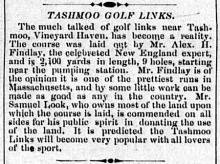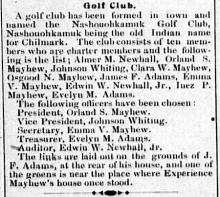Developers at a hearing last night described the Meeting House Golf Club project as a blessing for the environment. The project would remove nitrogen from the groundwater, they said, improve the salinity of the Edgartown Great Pond and protect the rare plant known as gypsywort.
Some members of the public questioned those claims. And two opponents of the project hinted that scientific experts will appear, when the hearing continues, to offer different ideas about the environmental impacts of the golf resort proposed by Rosario Lattuca.
This was the juxtaposition of views at last night’s hearing before the Martha’s Vineyard Commission. Conducted at the Old Whaling Church, the discussion became so technical that commissioner Michael Donaroma, who chaired the hearing, speculated that the commission might have to hire its own scientists.
“We might want to hire people to look at the scientific information,” he said as the two-and-a-half-hour meeting came to a close.
The discussion was the first part of a hearing that will probably continue on March 4 and possibly require a third meeting. The golf project, proposed for a 200-acre area known as the MacKenty-Bigelow property, is one of three proposed Island golf courses and the first to come before the commission for approval. About 135 people attended.
Much of the meeting time was devoted to a presentation by consultants for Mr. Lattuca, who is developing the course with his son, Barry Lattuca. In making their case, the consultants emphasized many points: The project will include no housing. It will include public walking trails on the property, which currently has no public access. And the proposed new buildings — there are five — are designed to match Island architecture and sit below tree lines.
In addition, the development team described a massive program of charitable contributions that includes, in part, $90,000 to pay off the mortgage on the Boys’ and Girls’ Club building, $60,000 for a grand piano and possibly other items at the Performing Arts Center, and annual gifts of $100,000 to a new charitable foundation to be set up by the golf club.
Additionally, an investor in the club declared that the course is not intended to be a playground for jet-setters.
“All the founding members own homes on Martha’s Vineyard,” said Anthony Fisher, one of the 30 founding members. “Our sole intention was to build a first-class, environmentally sensitive golf course for the current residents of Martha’s Vineyard.”
The founding members chose Rosario and Barry Lattuca over the other people currently trying to develop golf courses on the Vineyard, he said. They are committed to the environment, he said.
“Again, all our founding members are homeowners and a number of them live on the Edgartown Great Pond,” Mr. Fisher said. “If this course is found to pollute the ponds or the drinking water, we will unequivocally cease operation and immediately correct the conditions. This is not an empty promise. We will agree to it in writing.”
His remarks underscored the words of the consultants, who said their plan is environmentally safe. They described how they eliminated potentially hazardous chemicals from the plan. They showed how the course has been drawn to avoid a patch of purple needlegrass. And they said they will not use lighting near areas inhabited by threatened moth species. The area’s environmental health will be monitored by the Great Ponds Center, a research institute to be established by the golf club, they said.
Several members of the public were enthusiastic.
David Leaning, a pond area resident, spoke for himself and seven neighbors in favor of the project. High school golf coach Michael Joyce also favored the idea. So did Edgartown selectman Fred B. (Ted) Morgan Jr., who spoke of the long waiting list at the Edgartown Golf Club and the beauty of the Island’s existing golf courses.
On the other hand, Peter Look said he was neither in favor nor against. Rather, he spoke of the general pressure of rising taxes on Island people — and said commissioners should think about the charitable gifts: “If they call it extortion, let them call it extortion, but we need to get it. Let’s get the most out of it that we can get out of it.”
Others were skeptical. In particular, questions were raised about whether it is possible nitrogen can be removed from the groundwater, as proposed.
“I pump large quantities of water from the ground and I irrigate farm land,” said James Athearn, owner of Morning Glory Farm. “My gut feeling is highly skeptical. . . . If you consider how much water can be drawn from one well and the area that the plume may be traveling under, the contribution of high-nitrate groundwater coming out of that well would seem to be minuscule compared to the whole flow.” He also said: “The great ponds, I don’t think it’s saying too much to say they’re sacred. We just shouldn’t mess with the ponds.”
Others criticized the idea of environmental monitoring by a research center that is financed by the golf club. “I don’t know if that can be trusted to be a totally fair and impartial arbiter,” said Jeff Agnoli.
Similarly, opponent Rick Bausman told commissioners to expect additional input on the area’s soil: “You’ll hear more about that from people who know more than I do,” he said.









Comments